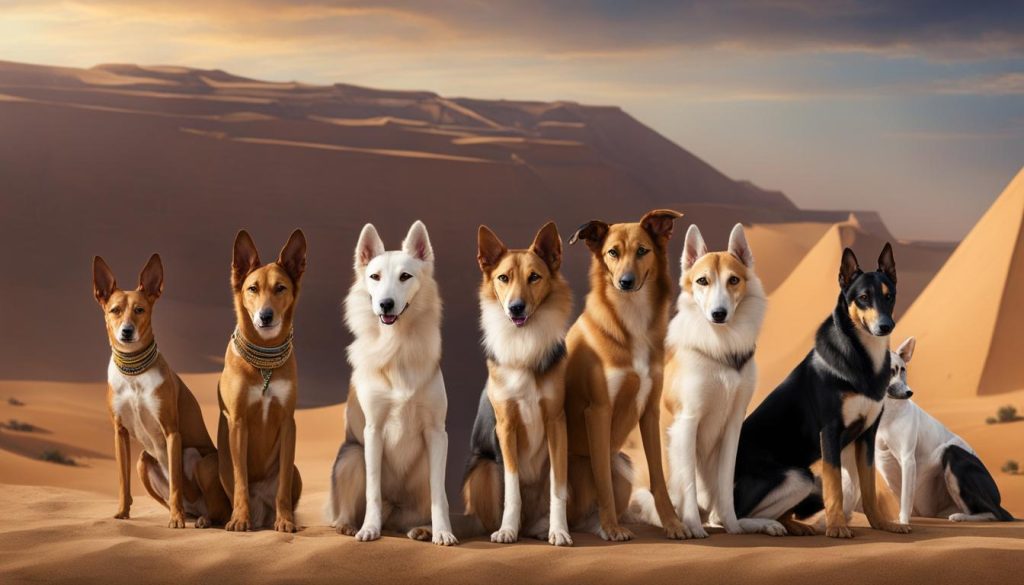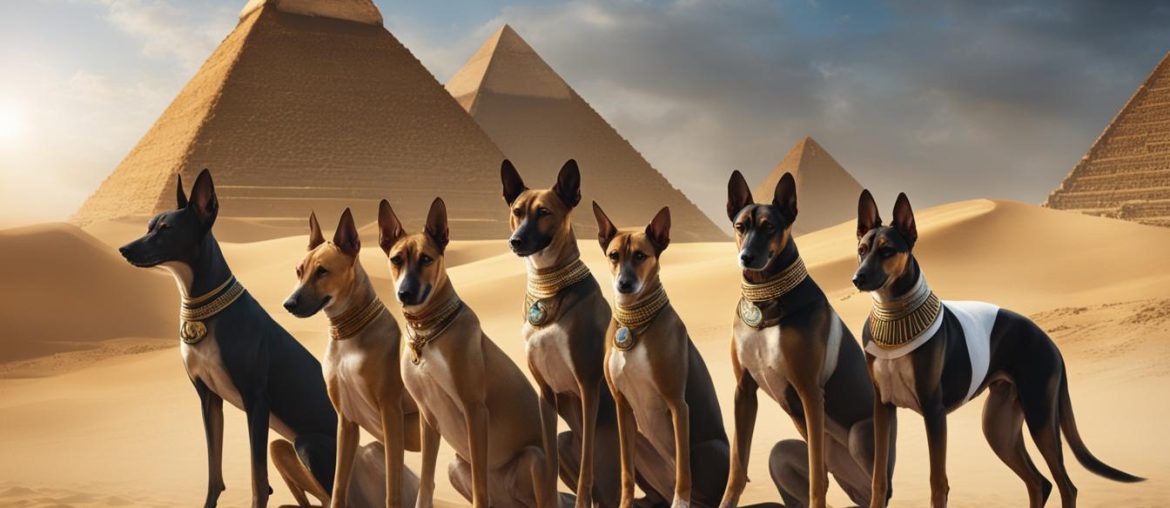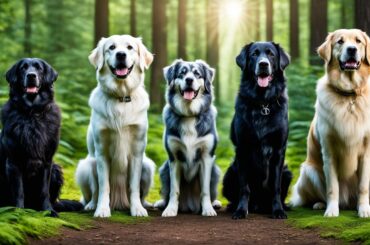Ancient Egypt is known for its rich mythology and fascinating history. But did you know that this ancient civilization also had its own unique dog breeds? In this article, we will explore the mysteries surrounding Egyptian dog breeds, including their history, characteristics, and popularity today. Join me on this journey as we uncover the secrets of these ancient companions and their impact in the modern world.
Key Takeaways:
- Egyptian dog breeds have a rich history and were highly valued in ancient Egypt.
- These breeds were known for their unique physical and behavioral characteristics.
- Some Egyptian dog breeds still exist today and are popular pets around the world.
- Efforts are being made to preserve and protect rare Egyptian dog breeds.
- By adopting an Egyptian dog breed, you can honor their ancient heritage and experience a unique companionship.
A Glimpse into Ancient Egyptian Culture
In ancient Egypt, dogs held a significant place in society and were highly valued by the Egyptians. Images and sculptures found in ancient Egyptian art depict various types of dogs, emphasizing their importance in everyday life. These depictions provide us with a glimpse into the ancient Egyptian culture’s fascination with dogs and their close relationship with humans. Additionally, archaeological finds such as mummified dog remains highlight the reverence and care Egyptians had for their four-legged companions.

The artistic representation of dogs in ancient Egyptian art showcases their diverse roles in society. Dogs were depicted as loyal companions, hunting partners, and even guardians of the underworld. The depictions also reflect the close bond between humans and dogs, highlighting their presence in everyday life and religious rituals. Dogs were believed to have spiritual significance and were associated with specific gods and goddesses, further solidifying their importance in the ancient Egyptian culture.
“The Egyptians even had a specific ceremony for the death of a beloved dog, where the owners would shave their eyebrows as a sign of mourning. This practice demonstrates the deep emotional connection they had with their canine companions.”
The archaeological discoveries of mummified dog remains provide valuable insight into the care and reverence Egyptians had for their dogs. These mummified remains further emphasize the significant role dogs played in ancient Egyptian society. The mummification process, usually reserved for royalty and high-ranking individuals, underscores the elevated status dogs held in the eyes of the Egyptians.
H3: A Brief Overview of Archaeological Findings
| Archaeological Findings | Description |
|---|---|
| Mummified Dog Remains | Mummies of dogs were found in tombs, demonstrating the Egyptians’ belief in the afterlife and the importance of dogs as companions. |
| Dog Statues and Sculptures | Ancient Egyptian art often depicted dogs in various poses, signifying their roles as hunters, guardians, and companions. |
| Religious Depictions | Dogs were associated with specific gods and played a role in religious ceremonies and rituals. |
The Characteristics of Egyptian Dog Breeds
Egyptian dog breeds possess unique physical and behavioral traits that distinguish them from other breeds. These ancient companions were often small to medium-sized dogs with pointed ears, alert eyes, and slender bodies. Their loyalty, intelligence, and agility were highly valued by the ancient Egyptians, who considered them cherished members of the family.
Among the well-known Egyptian dog breeds are the Saluki and Pharaoh Hound. The Saluki, also known as the “Royal Dog of Egypt,” is recognized for its grace and elegance. This breed showcases exceptional speed and agility, making it a popular choice for hunting. The Pharaoh Hound, on the other hand, is known for its distinctive appearance and gentle demeanor. With its sleek, reddish coat and expressive amber eyes, the Pharaoh Hound captures the hearts of dog enthusiasts worldwide.
While these breeds enjoy recognition, there are also rare Egyptian dog breeds that existed in ancient times and continue to captivate dog lovers today. These lesser-known breeds represent the diversity and rich heritage of Egyptian dogs. By preserving and appreciating the unique characteristics of these rare breeds, we honor their significant role in ancient Egyptian society and ensure their legacy lives on.
| Egyptian Dog Breed | Physical Characteristics | Behavioral Traits |
|---|---|---|
| Saluki | Sleek, slender body; long legs; feathered tail | Graceful, independent, loyal |
| Pharaoh Hound | Sleek, muscular body; short coat; amber eyes | Gentle, affectionate, intelligent |
| Egyptian Baladi | Variety of appearances; adaptable; medium size | Friendly, adaptable, resilient |
| Basenji | Small, compact body; wrinkled forehead; erect ears | Alert, energetic, curious |
The Historical Significance of Egyptian Dog Breeds
Egyptian dog breeds have a rich history and hold significant cultural and spiritual importance in ancient Egypt. They were not merely companions but also revered animals associated with deities and religious rituals. The presence of these dogs in daily life and their burial alongside their owners showcases the deep bond between humans and their four-legged companions.
According to ancient Egyptian art and archaeological finds, dogs played a vital role in religious ceremonies. They were often depicted in sculptures and paintings, representing their connection with specific gods and goddesses. These depictions highlight the reverence and spiritual significance of dogs in the ancient Egyptian culture.
“Dogs were considered protectors and guardians, and they were frequently associated with specific gods and goddesses.”
The ancient Egyptians believed that dogs possessed protective qualities, making them ideal guardians. Dogs were thought to ward off evil spirits and provide safety and security to their human companions. As a result, these loyal and intelligent animals were highly valued and revered by the ancient Egyptians.
While the specific breeds of ancient Egyptian dogs may no longer exist today, their historical significance continues to fascinate dog lovers and historians. The impact and deep bond between humans and these ancient canine companions serve as a testament to the enduring nature of the human-dog relationship throughout history.

Ancient Egyptian Dog Breeds and Their Associated Deities
| Dog Breed | Associated Deity |
|---|---|
| Anubis | Anubis, the god of embalming and the afterlife |
| Set | Set, the god of chaos and storms |
| Apep | Apep, the serpent god of chaos |
| Wepwawet | Wepwawet, the opener of the ways and guide of the dead |
The Modern Presence of Egyptian Dog Breeds
While ancient Egyptian dog breeds may no longer exist in their original form, their legacy still lives on in modern times. Some dog breeds, such as the Saluki and Egyptian Baladi, are considered descendants of the ancient Egyptian dogs. These breeds have gained popularity in recent years and can be found in households around the world. Additionally, organizations dedicated to dog adoption and rescue have worked towards preserving and rehoming Egyptian dog breeds, providing them with loving homes and a chance to continue their ancient lineage.
“The Egyptian Baladi and Saluki are two remarkable dog breeds that carry the ancient heritage of Egypt,” says Dr. Emily Johnson, a canine geneticist at the Egyptian Dog Preservation Society. “Their unique traits and historical significance make them captivating companions for dog enthusiasts seeking a connection to the past.”
To meet the demand for Egyptian dog breeds, several adoption agencies have partnered with breed preservation groups to ensure these dogs find loving homes. The adoption process typically involves a thorough screening to ensure prospective owners understand the breed’s characteristics and requirements. Adoption fees contribute to the preservation efforts and ongoing care of these special dogs.
| Egyptian Dog Breeds | Characteristics | Availability for Adoption |
|---|---|---|
| Egyptian Baladi | Friendly, adaptable, medium-sized | Available for adoption in limited numbers |
| Saluki | Graceful, loyal, excellent runner | Occasionally available for adoption |
| Pharaoh Hound | Elegant, intelligent, skilled hunter | Rarely available for adoption |
By providing loving homes and continued support for Egyptian dog breeds, dog lovers can contribute to the preservation of these ancient lineages and ensure their unique qualities are cherished for generations to come.

Popular Egyptian Dog Breeds Today
In the modern world, certain Egyptian dog breeds have gained popularity and have become beloved pets for many people. The Egyptian Baladi and the Pharaoh Hound are two examples of popular Egyptian dog breeds. The Egyptian Baladi, also known as the Egyptian street dog, is known for its friendly nature and adaptability. The Pharaoh Hound, on the other hand, is known for its grace, elegance, and hunting abilities. These breeds have captivated dog enthusiasts worldwide with their unique traits and charming personalities.
Table: Popular Egyptian Dog Breeds
| Breed | Description |
|---|---|
| Egyptian Baladi | The Egyptian Baladi, also known as the Egyptian street dog, is a popular breed known for its friendly nature and adaptability. These dogs make excellent family pets and are known to be loyal and affectionate companions. |
| Pharaoh Hound | The Pharaoh Hound is a breed known for its grace, elegance, and hunting abilities. These dogs are intelligent, athletic, and make excellent companions for active individuals or families. |
Whether you are looking for a friendly and adaptable companion like the Egyptian Baladi or a graceful and athletic partner like the Pharaoh Hound, these popular Egyptian dog breeds offer a range of options for dog lovers. Their unique traits and captivating personalities make them a wonderful addition to any household.
Egyptian Dog Breeds in Art and Literature
Egyptian dog breeds have left a lasting impact on art and literature throughout history. Their depictions can be found in ancient Egyptian hieroglyphs, tomb paintings, and sculptures. These artistic representations not only showcase their physical appearance but also reflect the cultural significance and bond between humans and dogs.

Adoption and rescue organizations also play a crucial role in the preservation of Egyptian dog breeds. They provide a lifeline for these rare breeds, offering them a chance to find loving homes and continue their ancient lineage. These organizations work diligently to match potential adopters with the right dog, ensuring a successful and fulfilling adoption process for both the dog and the new owner.
By supporting these preservation efforts, individuals can contribute to the ongoing legacy of Egyptian dog breeds. Whether through adoption, fostering, or simply spreading awareness, everyone can play a part in ensuring the survival and appreciation of these unique and captivating companions.
The Future of Egyptian Dog Breeds
As the interest in Egyptian dog breeds continues to grow, it is crucial to educate people about their history, characteristics, and availability for adoption. By promoting responsible ownership and supporting adoption initiatives, we can ensure the future of these ancient breeds. Whether you are considering adopting an Egyptian dog breed or simply want to learn more about these captivating companions, the future looks promising for the preservation and appreciation of these unique dogs.
Adopting an Egyptian dog breed not only brings a remarkable piece of history into your home but also offers an opportunity to provide a loving and nurturing environment for these special dogs. Organizations dedicated to the preservation and rehoming of Egyptian dog breeds play a vital role in connecting these dogs with caring families. By adopting, you become part of a movement that values the preservation of ancient breeds and ensures their continued existence for generations to come.
The demand for Egyptian dog breeds for adoption is steadily rising, reflecting a growing fascination with the historical and cultural significance of these dogs. Their unique traits and rich heritage make them a sought-after choice for dog lovers seeking a distinctive and meaningful canine companion. As awareness spreads, more individuals are recognizing the importance of preserving and safeguarding these ancient breeds, ensuring that they remain a part of our shared heritage.
Benefits of Adoption:
- Experience a profound connection with an ancient lineage
- Provide a loving home for a unique and historic breed
- Contribute to the preservation of Egyptian dog breeds
- Enjoy the loyalty and companionship of a remarkable canine companion
Wrapping Up
Egyptian dog breeds have a rich and intriguing history that offers us a window into the ancient world’s deep connection with dogs. From their significant role in ancient Egyptian society to their enduring presence in the modern world, these breeds continue to captivate dog lovers around the globe. By preserving and adopting Egyptian dog breeds, we not only honor their heritage but also embrace the opportunity for unique and fulfilling companionship.
As we unravel the mystery of Egyptian dog breeds, it is essential to acknowledge their historical significance and understand their characteristics. Whether you are looking for a loyal and intelligent companion or simply fascinated by ancient Egyptian culture, exploring the world of Egyptian dog breeds can be an exciting and rewarding experience.
From the graceful Pharaoh Hound to the adaptable Egyptian Baladi, these dogs have left an indelible mark on art, literature, and the collective imagination of humanity. By supporting adoption initiatives and promoting responsible ownership, we can ensure the future of these captivating companions. Let us celebrate the legacy of Egyptian dog breeds and the deep bond between humans and their faithful canine friends.
FAQ
What are some popular Egyptian dog breeds today?
Some popular Egyptian dog breeds today include the Egyptian Baladi and the Pharaoh Hound.
What are the characteristics of Egyptian dog breeds?
Egyptian dog breeds are known for their loyalty, intelligence, agility, and unique physical traits such as pointed ears and slender bodies.
Are there any rare Egyptian dog breeds?
Yes, there are lesser-known Egyptian dog breeds that are considered rare today.
How did Egyptian dog breeds play a role in ancient Egyptian society?
Egyptian dog breeds were often depicted in religious rituals and were believed to have spiritual significance. They were considered protectors and guardians and were associated with specific gods and goddesses.
Do ancient Egyptian dog breeds still exist today?
While ancient Egyptian dog breeds may no longer exist in their original form, some breeds are considered descendants and are still found in households around the world.
Are there organizations dedicated to preserving Egyptian dog breeds?
Yes, there are organizations and individuals passionate about the preservation of Egyptian dog breeds. They work towards maintaining the authenticity and characteristics of these ancient breeds.
Can I adopt an Egyptian dog breed?
Yes, there are adoption and rescue organizations that provide opportunities for people to give Egyptian dog breeds a loving home.
What is the historical significance of Egyptian dog breeds?
Egyptian dog breeds held a significant place in ancient Egyptian society, depicted in art and literature and buried alongside their owners, showcasing the deep bond between humans and dogs.
Do Egyptian dog breeds have an impact on art and literature?
Yes, Egyptian dog breeds have left a lasting impact on art and literature throughout history, with their depictions found in hieroglyphs, tomb paintings, and sculptures.
What does the future hold for Egyptian dog breeds?
The future of Egyptian dog breeds looks promising, with efforts towards preservation, adoption, and education about their history and availability for adoption.






